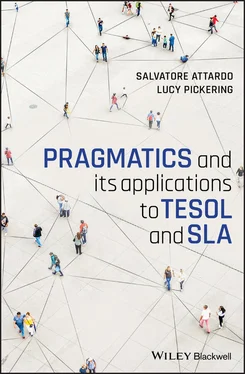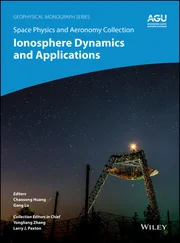Thus, I promise I will come and I will come express the same proposition, but differ in illocutionary force, being a promise and an assertion, respectively. Let us consider a different example: take the sentence below followed by its logical representation
Table 3.1Speech acts and their formal representation, according to Searle (1969).
| 1. |
assertions |
(p) |
| 2. |
requests |
! (p) |
| 3. |
promises |
Pr (p) |
| 4. |
warnings |
W (p) |
| 5. |
yes-no questions |
? (p) |
(10) The book is on the table.
p = ON(book, table)
The proposition expressed by this sentence is roughly that there is a property of being on something and that a book has that property and the something it is on is a table. When someone says The book is on the table they are asserting this proposition, or
˫(p) (recall that p stands for ON(book, table))
however, let’s assume that we don’t know whether it is the case that the book is on the table, we may ask about it, by saying Is the book on the table? which corresponds to
?(p)
or we may want the book to be on the table, and so we request that it be so, perhaps by saying Let the book be on the table , albeit usually people use polite variants of this, such as please, could the book be on the table , which corresponds in Searle’s notation as our (p) proposition with the force of a request:
! (p)
Likewise, we can utter (p) with the force of a promise or a warning: the book will be on the table (if you do something I want), which corresponds to
Pr(p)
or The book better be on the table (or I will do something you do not want), that is,
W(p)
In other words, the force changes with each illocution, but the proposition remains the same.
Searle categorizes speech acts into five large groups, 3which constitute the kinds of things one can “do with words” or “ways of using language” (Searle, 1979, p. vii)
1 assertives or representatives (assertions, claims and reports, …)
2 directives (requests, suggestions, commands, …)
3 expressives (thanks, apologies, complaints, …)
4 commissives (promises, refusals)
5 declaratives (performatives: the act of speaking itself performs the act: I sentence you to life in prison ; Class dismissed ).
(Searle, 1979, pp. 12–19). Thus, Searle directly counters Wittgenstein’s claim that there are countless kinds of language games, by reducing them to five very abstract types.
3.1.3 Realization Patterns
Every speech act has a set of realization patterns, that is, all the ways a given speech act may be produced. For requests, that set may include the following, among others:
(11) Could you open the window?
I wonder if you could open the window?
Open the window, please.
The actual realizations of speech acts differ across cultures. People request and apologize differently, depending on the culture in which they operate. Needless to say, variation on a cultural basis is not the only type of variability displayed by speech acts. There is also individual variation, that is, a given person may apologize more or less or differently than someone else, while still sharing broad cultural patterns. Another kind of variation is situational: one is more or less likely to apologize to a person depending on the relationship with that person.
Cross-cultural variation in speech act realization patterns can create serious cross-cultural problems, even though speakers may be producing grammatically correct sentences. For example, bald imperatives (e.g., pass the salt ) are acceptable between intimates in Polish (Wierzbicka, 1985) and Italian, but not in American English, where they may be perceived as rude. We look in detail at the SLA and TESOL applications of cross-cultural speech act differences later in this chapter.
3.1.4 How Speech Acts Work
There is substantial agreement that some version of speech act theory is correct and that indeed people do things with words, such as requesting, informing, promising, threatening, and so on. Much of the developments of speech act theory have consisted of establishing a detailed account of the “mechanics” of what makes a speech act work that way. In this section we consider the components of illocutionary force and felicity conditions. As we will see, they both help answer the question, what makes a promise, a promise (a request, a request, etc.).
Seven Components of Illocutionary Force
Searle and Vanderveken (1985) have identified seven components of illocutionary force. They are detailed here.
Illocutionary point: This is the purpose of the speech act. For example, promising has the point of committing the speaker to doing some action stated in the proposition. The point of a threat is to dissuade the hearer from doing something. The illocutionary point of a speech act is necessarily achieved by successfully performing the speech act. So, for example, I may have threatened my neighbor to keep him from shooting at the deer, but he may ignore my threat and keep shooting. However, if I successfully performed the threat I have successfully threatened the neighbor, regardless of whether the threat worked. Whether the neighbor stops shooting or not is a matter of perlocution, not of illocution.
Degree of strength of the illocutionary point: Two speech acts may have the same illocutionary point but with different strengths. Searle and Vanderveken use the examples ofrequest vs. insistsuggest vs. solemnly swearexpress regret vs. humbly apologizeHowever, we should not assume that only two-way oppositions exist, consider(12) tell vs. state vs. assert vs. attestwhich encode increasing strength and formality of the assertion (Searle & Vanderveken, 1985, p. 183; they do not analyze attest, but the extension is straightforward).
Mode of achievement: In some cases, an illocutionary act requires a “special set of conditions” for a felicitous performance of the act. For example, a witness in a trial may make a statement (an assertive) when asked if they would like a glass of water, but will be testifying when asked under oath if, say, they recognize the defendant. In this case, being the witness, being sworn under oath, being questioned by a lawyer or the judge, and so on constitute the mode of achievement. One cannot stand on the corner of the street, on one’s own, and testify (in the legal sense).
Content conditions: In many cases, the illocutionary force of the speech act will put restrictions on the proposition that the utterance must convey. For example, if one makes a promise, one cannot make it about an event that happened in the past. It would be odd, to say the least, to say I promise that if you are good, we will have eaten ice cream last week . Likewise, an apology must refer to something the speaker is responsible for:4 the utterance I apologize for the sum of the squares of the other two sides of a triangle being equal to the square of the hypotenuse is clearly odd or humorous (Searle & Vanderveken, 1985, p. 16).
Preparatory conditions: These conditions are the conditions that must obtain for the speech act to be both successful and not defective; for example, you can only successfully promise something if both the speaker and the person receiving the promise think that what is being promised is positive. Thus, it would be a defective promise to say If you behave today you will have to do all your chores tomorrow . Obviously, if the addressee believed that doing chores was a great privilege, this would be a successful promise. However, generally speaking, people do not like to do their chores.
Читать дальше












